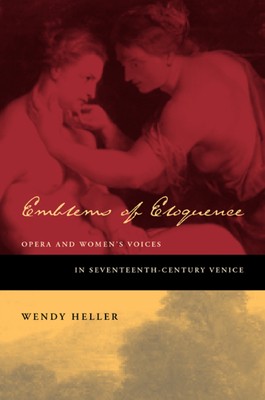
- We will send in 10–14 business days.
- Author: Wendy Heller
- Publisher: University of California Press
- ISBN-10: 0520209338
- ISBN-13: 9780520209336
- Format: 16.5 x 24.2 x 3.2 cm, kieti viršeliai
- Language: English
- SAVE -10% with code: EXTRA
Reviews
Description
Opera developed during a time when the position of women-their rights and freedoms, their virtues and vices, and even the most basic substance of their sexuality-was constantly debated. Many of these controversies manifested themselves in the representation of the historical and mythological women whose voices were heard on the Venetian operatic stage. Drawing upon a complex web of early modern sources and ancient texts, this engaging study is the first comprehensive treatment of women, gender, and sexuality in seventeenth-century opera. Wendy Heller explores the operatic manifestations of female chastity, power, transvestism, androgyny, and desire, showing how the emerging genre was shaped by and infused with the Republic's taste for the erotic and its ambivalent attitudes toward women and sexuality.
Heller begins by examining contemporary Venetian writings about gender and sexuality that influenced the development of female vocality in opera. The Venetian reception and transformation of ancient texts-by Ovid, Virgil, Tacitus, and Diodorus Siculus-form the background for her penetrating analyses of the musical and dramatic representation of five extraordinary women as presented in operas by Claudio Monteverdi, Francesco Cavalli, and their successors in Venice: Dido, queen of Carthage (Cavalli); Octavia, wife of Nero (Monteverdi); the nymph Callisto (Cavalli); Queen Semiramis of Assyria (Pietro Andrea Ziani); and Messalina, wife of Claudius (Carlo Pallavicino).
EXTRA 10 % discount with code: EXTRA
The promotion ends in 23d.19:14:48
The discount code is valid when purchasing from 10 €. Discounts do not stack.
- Author: Wendy Heller
- Publisher: University of California Press
- ISBN-10: 0520209338
- ISBN-13: 9780520209336
- Format: 16.5 x 24.2 x 3.2 cm, kieti viršeliai
- Language: English English
Opera developed during a time when the position of women-their rights and freedoms, their virtues and vices, and even the most basic substance of their sexuality-was constantly debated. Many of these controversies manifested themselves in the representation of the historical and mythological women whose voices were heard on the Venetian operatic stage. Drawing upon a complex web of early modern sources and ancient texts, this engaging study is the first comprehensive treatment of women, gender, and sexuality in seventeenth-century opera. Wendy Heller explores the operatic manifestations of female chastity, power, transvestism, androgyny, and desire, showing how the emerging genre was shaped by and infused with the Republic's taste for the erotic and its ambivalent attitudes toward women and sexuality.
Heller begins by examining contemporary Venetian writings about gender and sexuality that influenced the development of female vocality in opera. The Venetian reception and transformation of ancient texts-by Ovid, Virgil, Tacitus, and Diodorus Siculus-form the background for her penetrating analyses of the musical and dramatic representation of five extraordinary women as presented in operas by Claudio Monteverdi, Francesco Cavalli, and their successors in Venice: Dido, queen of Carthage (Cavalli); Octavia, wife of Nero (Monteverdi); the nymph Callisto (Cavalli); Queen Semiramis of Assyria (Pietro Andrea Ziani); and Messalina, wife of Claudius (Carlo Pallavicino).


Reviews